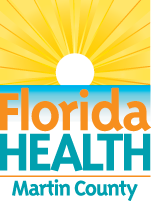It's a New Day in Public Health.
The Florida Department of Health works to protect, promote, and improve the health of all people in Florida through integrated state, county, and community efforts.
Preparing for Hurricane Irma
September 06, 2017
As Floridians continue preparations for hurricane Irma, the Florida Department of Health in Martin County is reminding residents about health risks associated
with the aftermath of a storm.
Food safety: Preventing food-borne diseases
- The Department of Health advises that individuals should not eat any food that mayhave come into contact with contaminated water from floods or tidal surges. Undamaged, commercially canned foods can be saved if you remove the labels and
then disinfect the cans in a bleach solution. Use ¼ cup of bleach in one gallon of water; re-label the cans including expiration date and type of food. Assume that home-canned
food is unsafe. - Commercially prepared cans of food should not be eaten if there is a bulging or opening on the can or the twist caps.
- Frozen and refrigerated foods can be unsafe after a hurricane. When the power is out, refrigerators will keep foods cool for about four hours. Thawed and refrigerated foods should be thrown out after four hours.
Sanitation and Hygiene: Preventing waterborne illness
- Basic hygiene is very important during this emergency period. Always wash your handswith soap and water that has been boiled or disinfected before eating, after toilet use, after participating in cleanup activities and after handling articles contaminated by floodwater or sewage.
- Flooding that occurs after the hurricane may contain raw sewage. If you have open cuts or sores exposed to the floodwater, keep them as clean as possible by washing them with soap and disinfected or boiled water. Apply antibiotic ointment to reduce the risk of infection. If a wound or sore develops redness, swelling or drainage, see a physician.
- Children should not play in floodwater or with toys that have been in floodwater. Disinfect toys by using ¼ cup of bleach, in one gallon of water.
Carbon Monoxide Dangers
Carbon monoxide is an invisible, odorless, tasteless gas, and is highly poisonous. Depending on the level of exposure, CO may cause fatigue, weakness, chest pains for those with heart
disease, shortness of breath upon exertion, nausea, vomiting, headaches, confusion, lack of coordination, impaired vision, loss of consciousness and in severe cases, death.
DOH recommends the following precautions to help prevent carbon monoxide poisoning:
- Do not burn charcoal or gas grills inside a house, garage, vehicle, tent or fireplace.
- NEVER use a generator indoors, including in homes, garages, basements, crawl spaces, and other enclosed or partially enclosed areas, even with ventilation. Opening doors and windows or using fans will not prevent CO build-up in the home.
- ALWAYS locate the unit outdoors on a dry surface, away from doors, windows, vents, and air conditioning equipment that could allow CO to come indoors. Follow the instructions that come with your generator.
- Install battery-operated CO alarms or plug-in CO alarms with battery back-up in your home, according to the manufacturer’s installation instructions.
- Test your CO alarms frequently and replace dead batteries.
- REMEMBER that you cannot see or smell CO and portable generators can produce high levels of CO very quickly. If you start to feel sick, dizzy, or weak while using a generator, get to fresh air RIGHT AWAY. DO NOT DELAY.
- If you have a poisoning emergency, call your nearest Florida Poison Information Center at 1-800-222-1222. If the victim has collapsed or is not breathing, call 911 immediately.
For Media Inquiries
@GoHealthyMartin
@HealthyFla





Connect with DOH